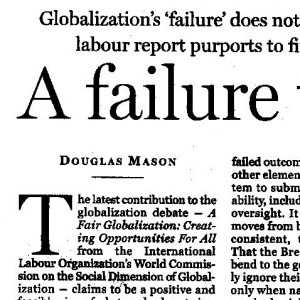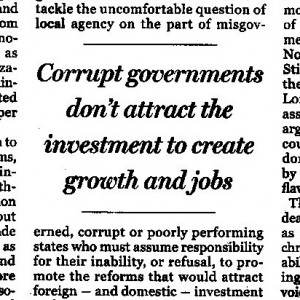 The National Post February 28th 2004
The National Post February 28th 2004
Globalisation’s ‘failure’ does not cause poverty, as the UN’s Internatonal Labour Organisation purports to find. In fact, just the opposite is true.
The International Labour Organisation’s (ILO) contribution to the globalisation debate, released this week, claims to be a positive and feasible view of what can be done to improve globalisation. If only. At a time when clear conclusions and solid policy advise are needed to help more of the world’s poor benefit from global economic integration and rise out of poverty, this UN organisation has given in to wooly thinking to come up with a report that does more to obscure than enlighten. Misdirected anger about the ills of the world may be tolerated from the disparate anti-globalisation movement, but it has no place in a UN body advocating policy change on a global scale.
Listing self-evident evils and moral imperatives—poverty, exclusion, the need for more  aid—the report makes sweeping claims and assigns faulty causation. Poverty and the inability of countries to benefit from wealth generation are a product of the global economy. Obvious falsehoods and contested points are asserted as fact, including a claim that globalisation has hindered tax raising powers and limited the ability of the state to play a proper role or provide social protection. Blame for these and other harm are given to the global international system which, notably, it fails to define. Instead, globalisation appears to be a straw man, to which all manner of problems are assigned, including everything from the brain drain to the rise of inequality. The wealth creating benefits of trade liberalisation are not mentioned or debated, giving sway to old nostrums about protectionism and asymmetrical trade access. Policy proposals are as vague as promoting “decent work” for all, and when it does get specific, it is for core labour standards, minimum levels of social protection and other mandated rigidities that should be left to national governments to regulate, rather than elevate into international coda. On other levels, the report is a grab bag of worthy aspirations and blandishments including better coordination of macro-economic policies, accelerated job creation, and pressing rich governments to fulfill their commitments to increasing aid.
aid—the report makes sweeping claims and assigns faulty causation. Poverty and the inability of countries to benefit from wealth generation are a product of the global economy. Obvious falsehoods and contested points are asserted as fact, including a claim that globalisation has hindered tax raising powers and limited the ability of the state to play a proper role or provide social protection. Blame for these and other harm are given to the global international system which, notably, it fails to define. Instead, globalisation appears to be a straw man, to which all manner of problems are assigned, including everything from the brain drain to the rise of inequality. The wealth creating benefits of trade liberalisation are not mentioned or debated, giving sway to old nostrums about protectionism and asymmetrical trade access. Policy proposals are as vague as promoting “decent work” for all, and when it does get specific, it is for core labour standards, minimum levels of social protection and other mandated rigidities that should be left to national governments to regulate, rather than elevate into international coda. On other levels, the report is a grab bag of worthy aspirations and blandishments including better coordination of macro-economic policies, accelerated job creation, and pressing rich governments to fulfill their commitments to increasing aid.
If nothing else, the ILO cannot be faulted for the depth of its ambition—it wants to rewrite the rules of the international trading system and global economic governance. The IMF, World Bank and the “global financial infrastructure” are blamed for the failure of outcomes—which is distinct from their policy advice—and calls made to submit these and other multi-lateral organisations to increased accountability, including an ill-defined global parliamentary oversight. It is at this point the ILO moves from being well meaning, if inconsistent, to outright dangerous. That the Bretton Woods institutions bend to the governments that routinely ignore their advice, coming to them only when national policy failure has reached crisis proportions, is a proposal that should make the many—deserved—critics of the Bank and Fund pause.
Much in the report is worthy and welcome. The market-busting agricultural cartels, tariff and non-tariff barriers and other trade distorting policies of the European Union, the US and other western governments—of which Canada’s is as much a transgressor as any—are rightly noted. Greater access to rich country markets are advocated through the Doha round of the WTO trade negotiations, including assistance for enhancing trade capacity in the developing world. It notes, correctly, that progress requires open societies and a democratic and effective state.
Where it goes wrong is a failure to address why so many countries are failing to benefit from globalisation. Here the ILO declines to tackle the uncomfortable question of local agency on the part of misgoverned, corrupt, or poorly performing states who must assume responsibility for their inability, or refusal, to promote the reforms that would attract foreign—and domestic—investment and create growth and employment. These countries have yet to seriously integrate into global supply chains and get on the next rung of the international trading system. This sounds less like the failure of globalisation than the failure to globalise.
To benefit more fully from globalisation such countries need to maintain macro-economic stability, promote the rule of law, invest more in education and other basic public services, establish proper legal and regulatory environments and remove market barriers. Less than the grand design and revolutionary change advocated by the ILO, these are the dull rules of slow but steady progress. Such omissions reveal the report’s fatal flaw in being geared toward the interests and perceptions of incumbent governments and poor performers, bewildered at their inability to benefit from the rise of economic integration. For these players, much comfort is offered: the iniquitous international system is to blame.
Much that is wrong is represented in one of the report’s co-chairs: Tanzanian President Benjamin Mkapa. His own country has been ruled by the same, single, party for 42 years, has never been at war, at least on its own soil, and has received billions of dollars of aid from western governments for decades. That the average Tanzanian now still has a per capita income of less than US$265 has less to do with alleged inequities of the international trading system, than the policy failures of successive Tanzanian governments.
The ILO’s effort, like any of the UN, is the product of an attempt to find “common ground” and bears the hallmarks of being created by an unwieldy 26 member commission—as diverse a group as a former first lady of Brazil to the governor of St Petersburg. That it includes Nobel economics prize winner Joseph Stiglitz, who penned an apologia for the report in the Financial Times of London this week, is an unfortunate association. Whatever the value of his arguments on the esoteria of capital account and trade liberalisation, he has done little service to the world’s poor by attaching his name to this deeply flawed report.
The third world does need a fairer deal. But, it won’t find it here. As much as anything, the ILO has chosen to chronicle a sense of anxiety and vulnerability among ordinary people amid rising global integration. Anonymous voices include that of an Egyptian who sums up a realisation about the power of globalisation as “sleeping on the shore when a big wave came”.
Indeed.
If there is something made vulnerable by the “wave” of globalisation it is the sustainability of bad governance and corrupt elites, supported by sovereign national barriers. If these are the real losers from the accelerated need, brought on by globalisation, to improve policy environments and compete for capital, then let’s have more of it. In the meantime, those countries wishing to make progress in reducing poverty and benefiting from global integration should look elsewhere than the ILO for advise. And fast.
Douglas Mason is an editor at The Economist Intelligence Unit in London
